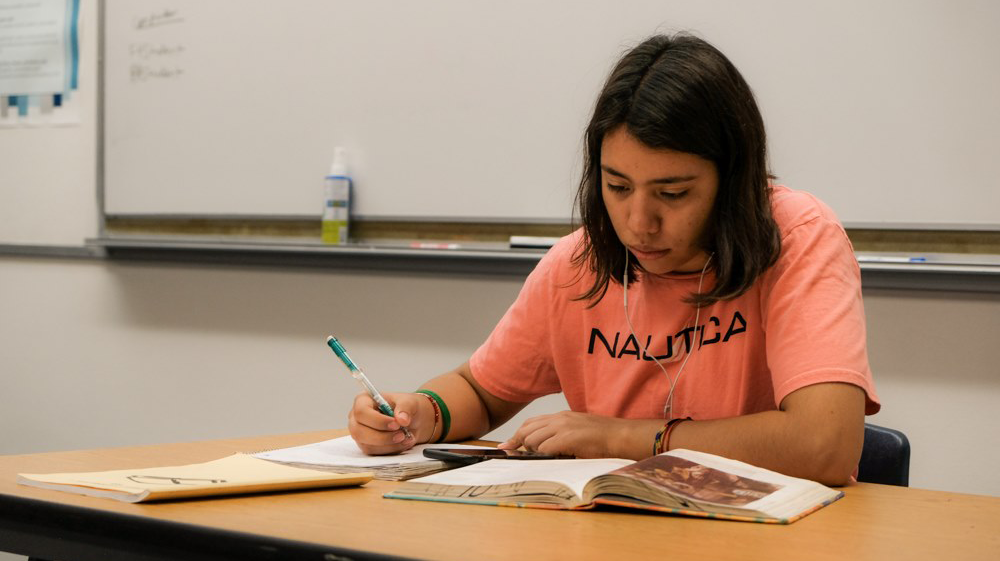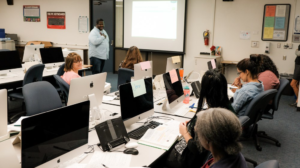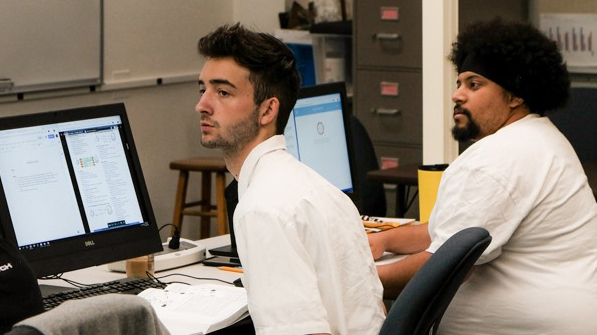 In April 2019 the East County Career Center and East Region Adult Education (ERAE) launched a pilot partnership to offer additional supports to adult learners with transition specialists onsite at the career center twice a week.
In April 2019 the East County Career Center and East Region Adult Education (ERAE) launched a pilot partnership to offer additional supports to adult learners with transition specialists onsite at the career center twice a week.
The San Diego Workforce Partnership spoke with Ute Maschke, California adult education regional consortium manager at ERAE, to learn more.
What is the ERAE?
ERAE is a consortium of Grossmont-Cuyamaca Community College District, Grossmont Union High School District Adult Education and Mount Empire Unified School District. The team is committed to leveraging current research, evidence-based practices and local and regional resources to help adult learners reach their goals.
We offer support before and as students enter adult education, transition within classes/programs/levels and as they transition out of adult education into careers, training or college. The transition team supports students with education planning, referrals to address barriers and by connecting students to programs that get them to their long-term goals.
How do ERAE transition services benefit clients?
Transition services build bridges between students and the many programs and supports available to them across the county. These services focus on individualized student goals with the ability to refer within programs, across consortium members and to outer layers of the network based on student self-identified need.
Because transition specialists carry knowledge about regional programs that cross industries and educational systems, they are able to bring these resources to students to map each step in the path to career readiness and employment, offering students license to guide and dictate the transition process outside of siloed program goals.
Why have an onsite presence at the career center?
 Student success—from completion of programs and career preparation to job placement—has been shown to dramatically increase when support services—including orientation, college and career mapping, one-on-one meetings and follow up—are incorporated into onsite services. It’s a win-win all around.
Student success—from completion of programs and career preparation to job placement—has been shown to dramatically increase when support services—including orientation, college and career mapping, one-on-one meetings and follow up—are incorporated into onsite services. It’s a win-win all around.
What are some of the common barriers adult learners face when coming to ERAE?
In my experience, we’ve seen a general lack of guidance, which can mean the individual may not have had access to career and education pathways and/or tailored services—a support necessary to help people move past additional barriers in their life that might block opportunity.
Some might feel their previous life and work experiences don’t count, which hinders career and education progress. Maybe there’s a lack of networking in their life—and without networking, there’s no room to discover new opportunities.
These services support building resilience, networks (alumni, mentors) and helping individuals stay informed about new opportunities.
“Individuals that come to us often have a big picture goal, but need someone who can help them narrow down resources and services to help them make an informed decision on what their next steps will be—whether it’s going to college, training for college, or exploring workforce programs throughout the county,” said Joyce Liou, a senior transition services coordinator with ERAE.
ERAE strives to build a system of support that is transforming adult education with a vision to create a system for Education That Works and Transitions That Matter. To learn more, check out adultedworks.org or visit the new East County Career Center.

